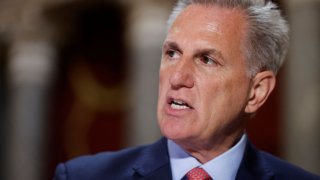
- House Speaker Kevin McCarthy said debt ceiling negotiations between his team and the White House were making progress.
- But McCarthy's optimism stood in contrast to guidance given to members of the House an hour later, as representatives were informed they wouldn't be required to remain in Washington over the weekend.
- Congress faces a June 1 deadline to raise or suspend the debt ceiling in order to avoid a catastrophic default.
WASHINGTON — House Speaker Kevin McCarthy said Wednesday that negotiations over raising the U.S. debt limit were progressing toward a deal despite disagreements over spending, with only eight days before the government could face an unprecedented default.
That urgency became more apparent later Wednesday. Fitch Ratings, one of the big three ratings agencies, placed the United States' triple-A status on "rating watch negative."
Get New England news, weather forecasts and entertainment stories to your inbox. Sign up for NECN newsletters.
Fitch said it still thinks there will be a resolution to the situation, but added, "The brinkmanship over the debt ceiling, failure of the U.S. authorities to meaningfully tackle medium-term fiscal challenges that will lead to rising budget deficits and a growing debt burden signal downside risks to U.S. creditworthiness."
The warning came after McCarthy projected hope that negotiators would reach a deal in time to avoid default.
"I wouldn't scare the markets in any shape or form," McCarthy said on Fox Business after negotiations at the White House ended for the day.
Money Report
"We will come to an agreement worthy of the American public and there should not be any fear," he added. "Money's coming in [to the Treasury] every day."
But McCarthy's optimism stood in contrast to guidance given to members of the House an hour later, as representatives were informed they would not be required to remain in Washington over the weekend to vote on a debt ceiling deal.
Instead, Rep. Steve Scalise, R-La., announced on the House floor that the chamber's weeklong Memorial Day recess would begin Thursday, as planned.
"If some new agreement is reached between President [Joe] Biden and Speaker McCarthy, members will receive 24 hours notice in the event we need to return to Washington for any additional votes, either over the weekend or next week," said Scalise.
The decision to let members fly home for the week is a tacit acknowledgment by House leadership that a deal to raise the debt ceiling does not appear to be imminent.
The parties face a June 1 deadline at which point the country will face significant risk that it won't to be able to pay its bills, according to Treasury Secretary Janet Yellen.
Yellen said Wednesday that she was already seeing "some stress in financial markets," driven by fears that the U.S. could stumble into a first-ever debt default.
Debt ceiling-related stress was affecting Treasury markets in particular, Yellen said at a Wall Street Journal event. These signs of stress "should be a reminder of the importance of reaching a timely agreement."
Republican negotiators traveled up Pennsylvania Avenue to the White House on Wednesday, where they joined their Democratic counterparts and talked for more than five hours.
As the U.S. inched closer to default and possible economic chaos, McCarthy blamed Democrats for the holdup.
"And the off-ramp here is to solve the problem to spend less than we spent last year," he said during a news conference at the Capitol.
The California Republican repeatedly touted a partisan spending bill that the House GOP passed in April with no votes from Democrats as the only option to raise the debt ceiling.
"Don't blame us Republicans when we put a reasonable bill together," he said.
Stocks closed lower following McCarthy's comments, as investors closely watched the talks for any sign of progress.
A default would wreak havoc on the U.S. economy and force millions to at least temporarily lose government benefit payments many rely upon to survive.
Republicans appear to have hardened their positions this week, and Democrats on Wednesday accused McCarthy of caving to pressure from the far right of his caucus. They said he had yielded to members who have made a laundry list of demands, yet who are unlikely to vote for any debt ceiling hike, no matter what it contains.
One of those laundry lists was released Wednesday by Rep. Chip Roy, R-Texas, a member of the ultraconservative House Freedom Caucus. Presented as a memo, the list contained seven provisions that were included in the debt limit bill House Republicans passed this spring, but which is dead on arrival in the Democratic-controlled Senate.
"The following reforms were part of the Limit, Save, Grow Act — each are critical and none should be abandoned solely for the quest of a 'deal,'" Roy's memo reads.
Pressure like this from hard-liners within his own party has made McCarthy's path to passing a bill much more treacherous, because he will need Democratic votes.
Biden has offered compromises, the Democratic official told NBC News, including freezing spending, rescinding unspent Covid funds and putting a two-year cap on spending.
But McCarthy dismissed these concessions and focused on the spending impasse.
"I will not put a bill on the floor that spends more money next year than this year," he said.






